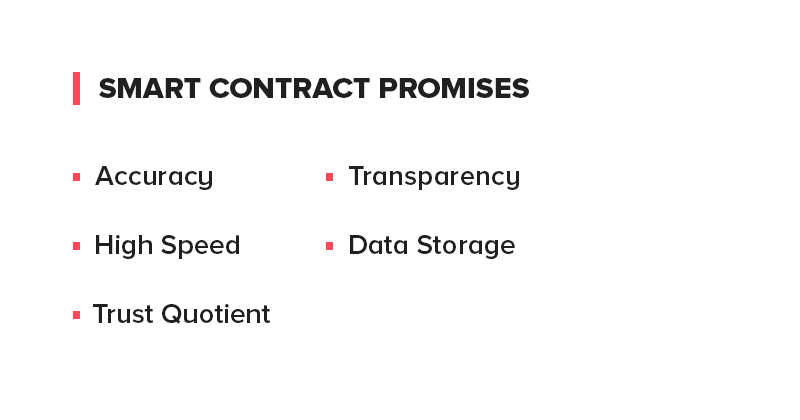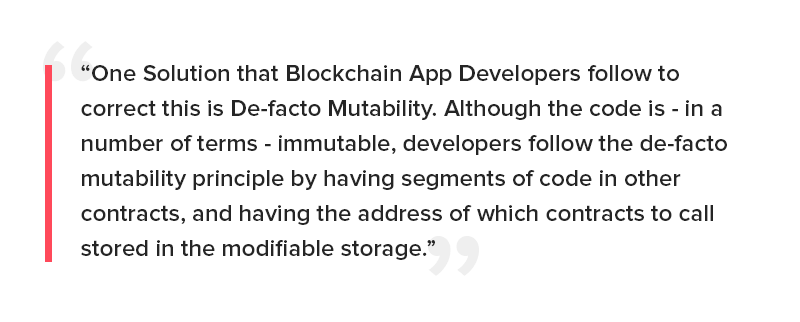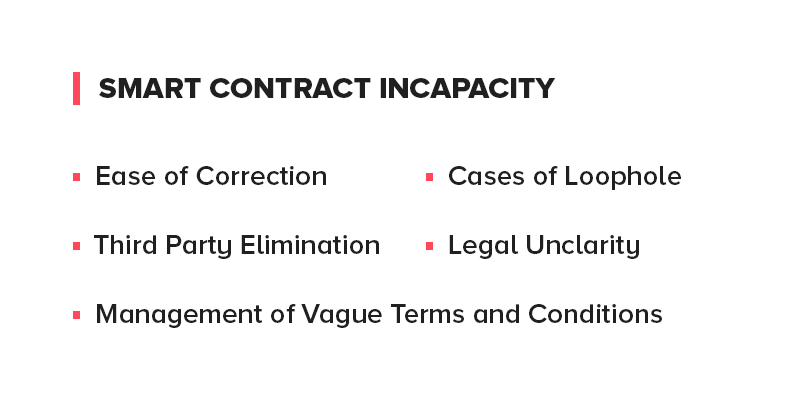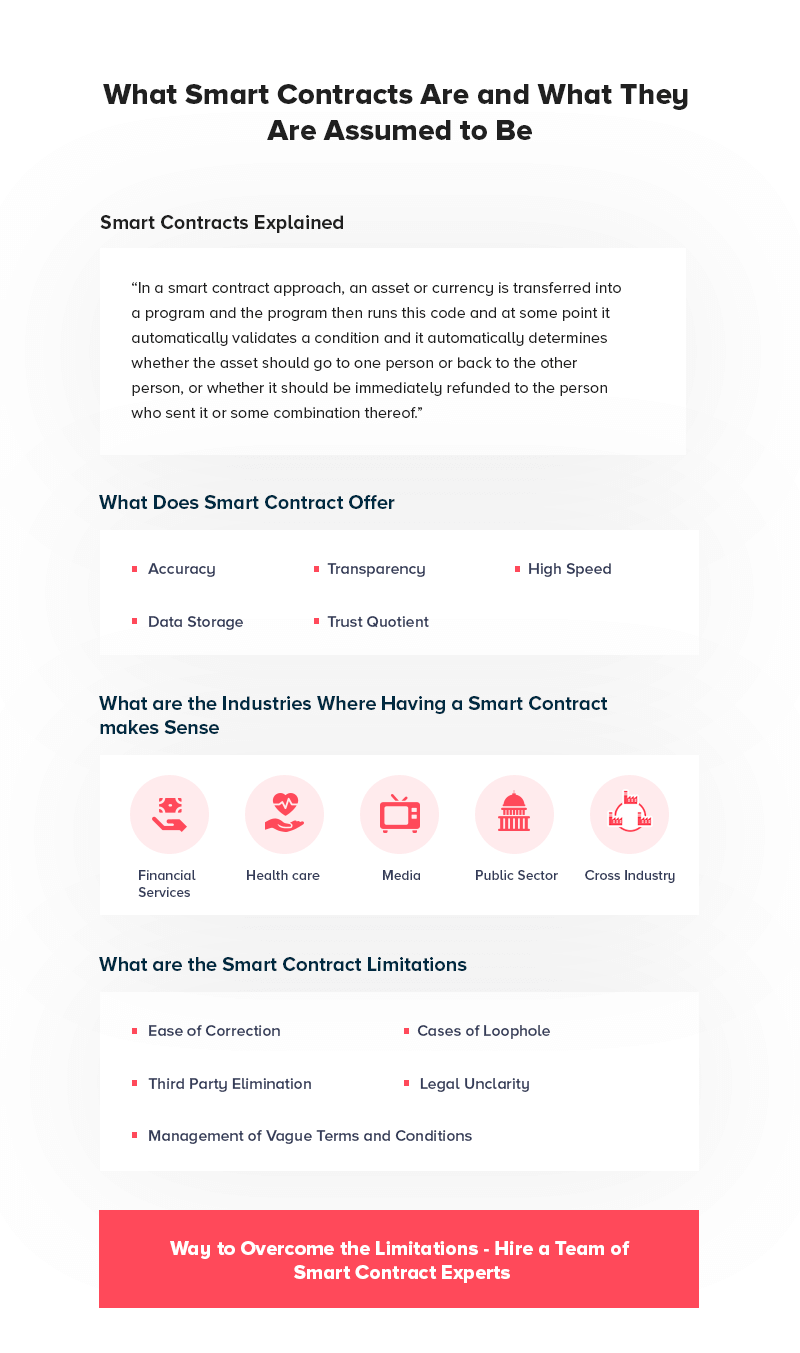There are a number of businesses across industries that swear upon the ease and modishness that Ethereum Smart Contract (the name the contract is popularized as) tag brings with itself.
While the world is getting blindsided by the hype that the new kid on the block has created –

There are several stories of hacks that have been revolving around the Blockchain industry, with the majority of them tracking back to Smart Contracts (more precisely – Ethereum Smart Contracts).
The horror stories mixed with the lack of understanding of the concept have done its job of keeping businesses at bay.
But turns out, like every other revolutionary technology, Smart Contract also comes with its set of limitations – knowing and resolving of which can help business enjoy the secure and hack-proof fruits of the efforts they put behind Blockchain App Development Companies.
In this article, we will be looking into what Smart Contracts are and what they are assumed to be. The aim is to give businesses a clear idea that while glorious, smart contracts are not perfect but there are steps to limit those limitations.
But.
Let us first see what Smart Contracts Stand For –
What Are Smart Contracts – Smart Contracts Explained
Smart Contracts, as highlighted in our Entrepreneur’s Guide to Blockchain, is one of the three pillars of the Blockchain technology.
Smart Contracts help you exchange anything of value in a transparent, conflict-free ecosystem that is based on Blockchain.
As Vitalik Buterin, the programmer at Ethereum puts it –
“In a smart contract approach, an asset or currency is transferred into a program and the program then runs this code and at some point it automatically validates a condition and it automatically determines whether the asset should go to one person or back to the other person, or whether it should be immediately refunded to the person who sent it or some combination thereof.”
Smart Contracts are basically self-executing contracts which are programmed in a way to ensure that the terms of agreements are met/unmet and then take a resulting action.
Talking of Smart Contracts, Know Which Platform – EOS or Ethereum is Winning the Race of Being the Best Smart Contract platform.
Now that you are up to speed with what Smart Contracts mean with our Smart Contracts Explained section, let us talk about what we lured you in for – The Smart Contract Benefits/ Offerings and the Smart Contract Limitations.
What Smart Contracts Promise To Do a.k.a Smart Contracts Benefits

1. Be Accurate
Smart Contracts are based on the requirement that all the terms and conditions are recorded explicitly.
2. Minimum to Zero Dispute Cases
The TnCs of Smart Contract are visible and are accessible to all the parties, which negates the scope of the dispute. Also, since a smart contract is definite and comes with no between the line clauses, the chance of dispute gets eliminated.
3. High Speed
As these contracts run on software codes, the speed of executing transactions are much quicker with Smart Contract as compared to real-world contracts, which calls for man-hours for documentation.
4. Store Data for Future Need
Smart Contracts record a set of essential details in every transaction, meaning that your details that are recorded in the contract get stored for future records, permanently.
5. Embed Trust
Smart Contracts come embossed with features like – Transparency, Security, and Autonomy, without zero possibilities of bias, manipulation, and error.
Use Cases of Smart Contract
1. Financial Services
- Trade Clearing – Lets you manage the approval workflow between the counterparties and transfer funds once the trade settlement amounts are calculated.
- Insurance Claim – Performs routing, error checking, and the approval workflow, once found correct, it transfer payment to the user once the payout is calculated on the basis of claim type and the underlying policy.
- Micro-Insurance – Estimates and Transfers the micropayments on the basis of usage data collected from IoT enabled device.
2. Healthcare
- EMR – Enable transfer or access to the health record once the multi-signature approval is established between the providers and patients.
- Medical Research – Researchers can gain access to the users’ health data by making micropayments to the patients for their participation.
- Track Health – Track health-related events through the various IoT devices that the patients’ use and rewards can be generated when they hit a milestone.
3. Media
Estimation and Distribution of the royalty payments can be done to the artists following the criteria set in the contract.
4. Public Sector
Public data can be stored on Blockchain and with the help of Smart Contract, the information can be sent to the parties asking for them, keeping the data owner in the loop.
5. Cross-Industry
- Supply Chain – Transfer the payment once the multi-signature approval for the letter of credit is received. Smart Contracts can also be used to issue port payments after custody change for the bills of lading is made
- Product Provenance – Enable chain-of-custody for the products in the supply chain in which party in custody can log evidence about the product.
- Person-to-Person Transaction – Help match parties and enable transfer of payments automatically for different person-to-person uses, such as insurance, lending, energy credits, etc.
- Voting – Validate the voter criteria, enter the vote in Blockchain, and initiate specified action that would follow the majority vote.
So these were the pros and instances where having a Smart Contract make sense, now let us hit on the area which throws a light on the limitations of the concept – ones which are rarely talked about.
What Smart Contracts Does Not Promise To Do
1. Ease of Correction
Being a Blockchain element, Smart Contracts come with the same benefit of Immutability as Blockchain. While this immutability set standards in terms of security, there are a few limitations that come tagged along as well.
Since they are nearly impossible to change, even the slightest error in code can turn out to be expensive and time-consuming to correct once the smart contract is deployed to execute.

2. Good Faith Dealing
Unclarity when it comes to ‘implied covenant of good faith and fair dealing’. In the US Law, there is a concept of Good faith, which states that the parties will deal with each other fairly and won’t rob each other off from getting the benefits of the contract.
But, with Smart Contracts, it is difficult to ensure that the terms are met in accordance with what was implied.
Suppose you order an autographed Tennis Ball but what you get is a forged ball. Now, under ordinary circumstances, you would have been able to take the case to the court following the Contract Law, but with Smart Contracts, the possibility is next to nothing.
3. Handle Vague TnCs
Contracts are made up of several implied terms and conditions, which are not all in black and white. While it is fairly easy for a smart contract to deal with the transaction where only a very limited set of parties are involved and the event that they have to perform is fairly direct, if you plan on introducing event like the one used as an example above, smart contracts fail to be the right mode.
Inability to handle vague tncs are one of the major Smart Contract legal issues, which is staring at immediate rectification if the concept wishes to see mass adoption.
4. Non Elimination of Third Party
While elimination of third parties is a paradigm that has been set for Blockchain and Smart Contract, likewise, the concept in no way eliminates them.
Take lawyers for example. While yes, it is true that users will not have to go to them to get the contract made, developers will have to be in contact of lawyers to know the terms on which the smart contract will be based.
In the end, the involvement of third-party entities never goes away, they just take up different roles from what they take in the non-decentralized smart contract.
5. Dispute Settlement
Disputes are the elements that play an inherent role in Smart Contracts. While in case of paper contracts, it can come as a result of an ambiguous statement like ‘Sufficient Cause’, in Smart Contract, it can come as soon as the user passes a statement saying that the code is bugged.
To determine which party is right, users will ultimately have to resort to starting a legal procedure – avoiding which was the one reason Smart Contract was ever brought into existence.
There are multiple options when it comes to handling disputes with Smart Contract –
- The one option to solve disputes in Smart Contract is to rely on votes. If there are multiple parties involved in the contract, businesses can call a vote and decide which party is in the right.
- Introduction of arbitrator(s), who will act as a judge in case of dispute.
- Making it necessary to have the signature of both the parties before the contract is closed.
These are some of the issues that have come to the surface now when Smart Contracts are yet to see mass adoption. More are expected to come bubbling up as the concept grows and find a place in integral part of all businesses.
In the end, as far as you, as a business, look at the positive sides of the Smart Contract, you will see a number of reasons to introduce the concept in your business, but when you boil it down, a number of limitations come up, which can majorly be resolved in one way –
How to Overcome the Limitations of Smart Contract

Either you work your way around by ignoring the shortcomings of Smart Contract, assuming that the concept will revolutionize your business or you take the right move which would make your Smart Contract, whether it is an Ethereum Smart Contract of one that is based on any other platform, unhackable.
The Right Move talked about here is Hiring a Team of Blockchain Developers who are well accustomed with the concept, have knowledge of Parallel Programming, Know of the kind of bugs that can come in writing the Smart Contract Code.
Only when you invest in a team of Smart Contract experts, you will be able to get a contract that is ready to be complex.


strategies your digital product.




